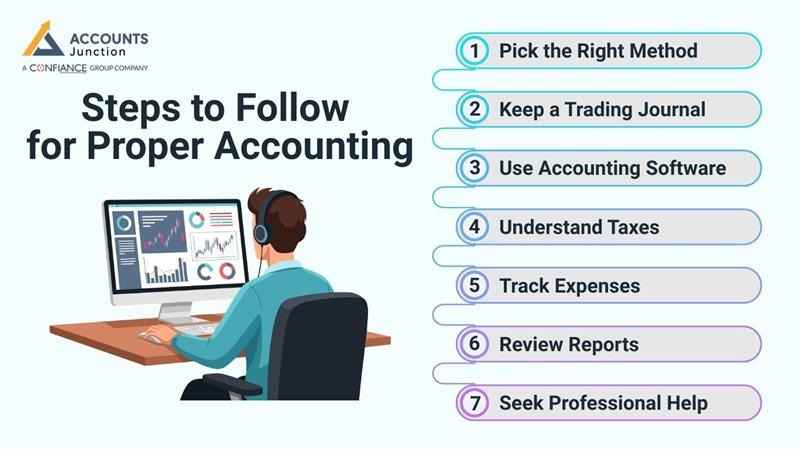
Best way to do accounting for traders in india
Accounting for traders in India is key to managing your trading business. It keeps your finances organized and helps you meet tax rules. This guide covers the steps and tips for better accounting. Good accounting helps track profits and losses, making planning easier. It also ensures you follow tax laws and avoid fines. With clear records, traders can make better decisions and grow their business.
Why Is Accounting for Traders Important?
-
Track profits and losses
Accounting helps traders see their gains and losses over time.
-
Ensure tax compliance
Traders need to report income and costs for taxes. Proper records avoid fines.
-
Make better decisions
Good records help traders make smart choices.
-
Avoid costly mistakes
Clear records help prevent errors that could cause big losses.
-
Support growth
Accounting helps traders plan and take advantage of new opportunities.
-
Build trust
Clear records build confidence with investors, banks, and partners.
Steps to Follow for Proper Accounting
1. Pick the Right Method
- Cash Method: Record income and expenses when money is received or paid.
- Accrual Method: Record income and costs when they happen, not when money moves.
2. Keep a Trading Journal
- Daily entries improve accounting for traders by recording fees, commissions, and profits clearly
- Include all related costs, like fees and commissions.
3. Use Accounting Software
- Software is essential in modern accounting for traders as it helps in saving time and avoiding errors.
- Some popular options: Zerodha Varsity, Tally, QuickBooks.
4. Understand Taxes
- Business Income: For active traders, income is taxed as business income.
- Capital Gains: Long-term traders pay tax on profits as capital gains.
- Short-Term Capital Gains: Taxed at 15%.
- Tax on Long-Term Investments: If your long-term capital gains are over ₹1 lakh, a 10% tax is charged. This applies to profits made from assets held for more than a year. Keep track of your investments to ensure correct reporting and tax payments.
5. Track Expenses
- Keep track of costs like software, fees, and tools.
- These can be used for tax deductions.
6. Review Reports
- Regularly check your profit and loss statements.
- Helps you monitor progress and make smarter choices.
7. Seek Professional Help
- Consult a tax expert for advice.
- Ensure compliance and save on taxes with the right guidance.
Types of Traders and Their Accounting Needs
1. Intraday Traders
- Different approaches exist in accounting for traders for intraday vs delivery trading.
- Must maintain detailed records of each trade for accurate profit and loss tracking.
2. Delivery Traders
- Hold assets for a longer period before selling.
- Need to track capital gains and categorize their income accordingly.
Key Principles of Accounting for Traders
- Record Every Trade: Note all details like dates, prices, and fees.
- Separate Accounts: Keep personal and trading money in different accounts.
- Track Gains and Losses: Check your profits and losses often.
- Log Expenses: Record all trading costs like fees and tools.
- Stay Organized: Keep your records tidy and easy to find.
Benefits of Accounting Traders in India:
- Compliance and Legal Requirements: Helps follow tax rules and avoid fines by keeping clear records.
- Better Decision Making: Gives insights into profits and costs, helping with better choices.
- Financial Planning and Budgeting: Helps create budgets and find ways to save money.
- Access to Funding and Loans: Good records help get loans and show the business is strong.
- Evaluation of Business Performance: Tracks growth and checks if the business is doing well.

Tips for Traders Accounting
- Separate Finances: Keep personal and business money separate. Open a business account for your trades. This makes accounting easier.
- Track Expenses: Keep records of all costs, like fees and software. Organize them for easier tax filing.
- Keep Trade Logs: Write down details of each trade, like date, price, and fees. This helps you track gains and losses.
- Monitor Gains and Losses: Track your gains and losses often. Keep short-term and long-term gains separate. Check with a tax expert to avoid problems.
- Use Accounting Software: Use tools made for traders. They assist with taxes and tracking gains and losses.
- Stay Organized: Keep your trading papers in order, like receipts and tax forms. This helps when you need them.
Expenses Traders Can Claim
- Brokerage Fees: Deduct fees paid to brokers.
- Internet and Phone Bills: Expenses related to trading can be claimed.
- Office Expenses: A portion of rent and utilities if working from a home office.
- Depreciation of Equipment: Depreciation on computers and trading software used for business.
How to File Taxes as a Trader in India
- Report Business Income: If trading is your business, report income in the ITR-3 form.
- Claim Expenses: Deduct trading costs like fees, internet bills, and software.
- Pay Advance Tax: If your tax is over ₹10,000, pay taxes in four parts.
- Submit ITR: File your Income Tax Return after calculating income, expenses, and deductions using the ITR-3 form.
- Maintain Records: Keep records of trades and receipts for at least 6 years for future checks.
- Track Capital Gains: Calculate short-term and long-term gains. Short-term gains are taxed at 15%, long-term at 10% (above ₹1 lakh).
- Declare Gains: Report short-term and long-term gains separately.
- Carry Forward Losses: Losses can be carried forward to reduce taxes in the next year.
- Use Tax-saving Investments: Invest in options like NPS or tax-saving deposits to lower taxable income.
- Seek Help: Ask a tax expert if you're unsure about filing to avoid mistakes.
Common Accounting Challenges Traders May Face
Even with good intentions, traders can face hurdles.
- Missed Entries: Sometimes trades or fees are forgotten. This can make profit tracking hard.
- Mixing Personal and Trading Funds: Using one account for all money can confuse records.
- Complex Tax Rules: Capital gains rules can be tricky for beginners.
- Overlooking Small Costs: Minor expenses like news subscriptions may add up.
- Software Glitches: Tools may crash or give wrong calculations, causing errors.
This section may help readers anticipate and prevent issues before they grow.
Best Practices for Organizing Trading Records
Clear organization can save time and stress.
- Keep a Digital Folder: Store trade logs, invoices, and bills in one place.
- Label Everything: Name files with dates, asset names, and types.
- Regular Backups: Make copies of records weekly or monthly.
- Consistent Formats: Use the same format for entries in journals or software.
- Monthly Review: Check numbers at least once a month to catch mistakes early.
These habits may improve both decision-making and compliance.
Partnering with experts can improve accounting for traders and avoid costly mistakes. By keeping accurate records, choosing the right accounting method, and understanding tax laws, traders can simplify their financial management. This will not only help in tax filings but also improve trading decisions. Always seek professional help if needed to ensure compliance and avoid costly mistakes. At Accounts Junction, we help traders in India keep clear records, pick the right methods, and follow tax rules. Our support helps with smooth financial management and smart trading choices. We ensure compliance and avoid mistakes.
FAQs
1. What is the best accounting method for traders in India?
- Traders can use cash or accrual methods, but one method per year simplifies record keeping and tax filing.
2. Do traders in India need to maintain a trading journal?
- Yes, keeping a journal helps track every trade, calculate profits, and meet tax rules.
3. Are intraday profits treated as business income in India?
- Yes, intraday trading gains are often treated as business income for tax purposes.
4. How are delivery trades taxed in India?
- Profits from delivery trades may fall under capital gains rules, with separate short-term and long-term rates.
5. Can traders in India claim brokerage fees as expenses?
- Yes, brokerage fees paid for trades can be claimed to reduce taxable income.
6. Is accounting software useful for Indian traders?
- Yes, software like Tally or QuickBooks can track trades, profits, and taxes efficiently.
7. Do traders need separate accounts for trading and personal money?
- Yes, separate accounts make it easier to track profits, losses, and expenses.
8. Which Income Tax Return should traders file in India?
- Traders with business income or intraday gains should file ITR-3 for proper reporting.
9. How long must traders maintain accounting records in India?
- Records should be kept for at least six years for tax compliance and audits.
10. Can software and tools used for trading be claimed as deductions?
- Yes, trading platforms, analysis tools, and related software costs can be deducted.
11. How should traders calculate capital gains for delivery trades?
- Subtract purchase cost and fees from sale value, then apply short-term or long-term tax rates.
12. Can traders carry forward losses to reduce future taxes?
- Yes, both short-term and long-term trading losses may be carried forward under Indian tax rules.
13. What are the key expenses traders can claim in India?
- Brokerage, internet, software, home office utilities, and depreciation on equipment can be claimed.
14. How often should traders reconcile their accounts?
- Monthly or quarterly reviews help track gains, losses, and avoid errors in reporting.
15. Are intraday losses deductible for Indian taxes?
- Yes, intraday losses may offset other business income, but proper records must be maintained.
16. Can traders avoid penalties with proper accounting?
- Yes, maintaining detailed trade records and expense logs may prevent tax penalties.
17. Do long-term delivery trades require separate accounting?
- Yes, long-term trades need separate tracking for capital gains calculations over a year.
18. What is the role of depreciation in trading accounting?
- Depreciation on laptops, computers, and trading software can reduce taxable income.
19. Is it mandatory to hire a tax professional for trading accounting?
- Not always, but professional advice may help traders avoid mistakes and maximize deductions.
20. Can missing entries in trading records lead to fines?
- Yes, incomplete or inaccurate accounting may trigger tax penalties or audits in India.
